Philip Habib (February 25, 1920 – May 25, 1992) was a career diplomat known for his work in Vietnam, South Korea and the Middle East. The New York Times described him as “the outstanding professional diplomat of his generation in the United States.” Habib was Lebanese-American and raised in Brooklyn by Lebanese Maronite Catholic parents. He graduated with a Ph.D. in agricultural economics from Berkeley in 1952 then entered the Foreign Service. He served as Deputy Assistant Secretary of State for East Asian and Pacific Affairs from 1967–1969 and was part of the Vietnamese peace talk delegation in 1968. He was Ambassador to South Korea (1971–1974), Assistant Secretary of State for East Asian and Pacific Affairs (1974–1976), and Under Secretary of State for Political Affairs (1976–1978), during which time he was the chief mediator between Israel and Egypt in the Camp David Peace Accord.
Habib retired from the Foreign Service after suffering a third heart attack but soon returned to public service in 1979 as a special adviser and in 1981 was sent as special envoy by Ronald Reagan to mediate the Lebanese Civil War. Habib negotiated a peace agreement that allowed the PLO to evacuate the besieged city of Beirut.
In 1982 he was awarded the Presidential Medal of Freedom — the highest official honor given to a U.S. citizen by the U.S. government. John Boykin’s biography of Habib, “Cursed is the Peacemaker” focuses largely on Habib’s mediation between Israel and Lebanon during their war in 1982. In 2006, Habib was featured on a U.S. postage stamp, one of a block of six featuring prominent diplomats.
In these excerpts, he talks about his beginnings doing crop reports, the measures taken to avoid the media during the Paris Peace Talks, the breakthrough in negotiations that was undone at the last minute, his heart attack, and the frustrations during the Lebanon negotiations in the 1980s that led to his eventual resignation.
Go to Moments in U.S. Diplomatic History
The Economics of the Peach Market
HABIB: I went straight to the Ph.D….. While I was in Berkeley, I was a research associate assistant to one of the professors. We did research on various crop problems. My first publication — I was the co-author of a pamphlet issued by the University of California on the asparagus situation, or the spinach situation in California. I was the co-author, I had done the statistical research.
Q: Filed in the Library of Congress?
HABIB: I filed in a lot of places. There’s another one on the premium peach market in California. My first publication, however, was as co-author of the spinach situation in California. At any rate, it was not bad training in terms of economic reporting in the Foreign Service. Let’s face it. I later wrote hundreds of crop reports as an economic reporting officer in my first post in the Foreign Service…. I was assistant agriculture attaché in Canada.
On Avoiding the Media during the Paris Peace Talks
HABIB: I was assigned temporary duty and I was there all the time, never left except for briefing trips back home. We started out living at the Crillon Hotel and after seven or eight months of eating out all the time, I rented a little pad, a two and a half room pad up in an old house about five minutes from the embassy. I could fall out of bed and be in the embassy in five minutes if anything happened, and we began the negotiations. The negotiations were for the purpose of a total bombing halt, and to negotiate the end of war.
From our standpoint, we were willing to go for a total bombing halt, but we wanted to get a proper negotiation going including the South Vietnamese. We had South Vietnamese liaison guys there in Paris.
But the actual negotiations were between us and the North Vietnamese. We started in May and by the fall of that year we had negotiated the total bombing halt under conditions of bringing about full fledged negotiations, and also with certain understandings as to what would not be done.
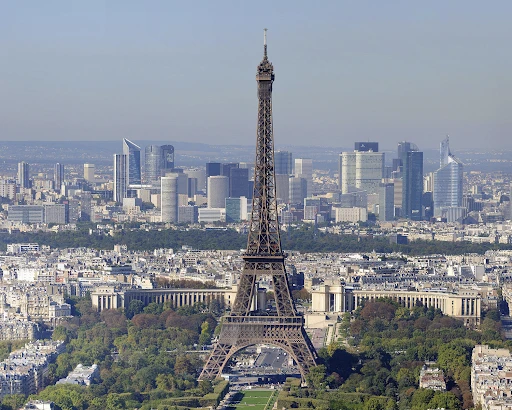
It’s beginning to fade from my memory, but it’s still quite clear what we did, including such things as no major attacks on cities. We had all sorts of things which were quite clear from what had gone on in the negotiations.
We had two levels of negotiations. We had the formal talks every Thursday. We would convene at the Majestic Hotel at Avenue Kleber. The delegation would file into this magnificent conference hall, and we’d sit there and read statements to each other, and go out and talk to the TV cameras, and go back to the office and meet again the next Thursday.
Well, that went on for a while, and obviously we weren’t going to do anything under that spotlight, so we had a couple of private meetings, and then we set up the formal secret negotiations. They had a safe house, and we had a safe house. Our safe house was staffed by the CIA, but with Defense people living there, and a couple of secretaries took care of the safe house. And they had a safe house which was supplied to them by the French Communist Party. Sometimes we’d meet in our safe house, sometimes we’d meet in their safe house.
HABIB: [Theirs was on the] outside, on the fringe of the city. That was the Kissinger thing. Now, we ran it secretly. Nobody knew, nobody had a clue where they were. They knew that something was wrong, but couldn’t figure out what. I remember one CBS reporter said, “Now we’ve figured it out, you’re meeting on a houseboat on the Seine.” Yes, that’s right, on a houseboat, you get a rowboat and follow us out. They never discovered it, and why? We ran it, we were professionals. Nothing ever leaked from them, or from us. We had a whole series of good meetings.
Q: Maintaining secrecy on both sides.
HABIB: That’s right, and we held I don’t know how many dozens of these meetings until we negotiated the terms of understanding. As a matter of fact, they were finally initialed and signed on the last day, but I wasn’t there. When they were finalized and initialed I had been ordered back to brief the president, because there was a lot going on back here. So I came back to Washington to brief people here on where things stood. I didn’t attend the last secret meetings with Harriman and Vance, which was the only time that they allowed photographs up until that time. There were photographs taken at the last meeting. I don’t have a copy because I wasn’t there — one of the photographs I really would have liked to have because I had been one of the players right from the beginning.
Cy Vance and I had carried on most of the secret negotiations. We would bring Harriman in for the key ones. Cy and I had meeting after meeting, and a couple of times I had meetings alone, at the last stages when we were drafting terms in getting the agreement on the shape of the table. All that was done in that period under the secret negotiation.
Q: So you would have the press come around for those once-a-week meetings.
HABIB: That’s right. The press was there for the once-a-week meetings.
The time when the press arrived, after the formal once-a-week negotiations, with nothing going on, we were having intensive 7-8-hour-long meetings with the Vietnamese that the press knew nothing about. Now the way we managed it, I set up the system.
For example, let’s say the meeting was in our safe house–we had a safe house in a place called St. Cloud. We had one somewhere else and a third one in another place, then the Vietnamese had a safe house out at Choissy-le-Roi. Harriman would stay out in Auteuil. Vance would be at the embassy with me. We had a CIA guy, with an unmarked car rented by this CIA guy. He was not a guy from the station. He was a special guy brought in nobody knew….
He would rent a private car. He would park the car up by the Madeleine. The meetings usually consisted of Harriman, Vance, and myself, John Negroponte and Dave Engel, Bill Jordan. Negroponte and Engel would do the notes, and I would take notes too. If it was just Vance, it would be Vance, myself, and probably Negroponte, the three of us, or maybe Engel would.
Q: Did you each talk in your own language and then use a translator?
HABIB: That’s right. They wouldn’t negotiate in French. They wouldn’t do it even in the big meetings, they would not negotiate in French. The only time they would speak French and negotiate was privately. One night I had the deputy guy over for dinner at my apartment, and we spoke French….
At any rate, the guy would park the car up there at a given hour; let’s say the meeting was going to be at 10:00, a half-hour drive or so. At 9:00 Dave Engel, carrying the documents in a satchel, would wander up toward the Madeleine, get into the car, the driver would then drive down and he would go up the Champs-Elysées.
Meanwhile, Cy Vance and I would go out the back door of the embassy and we would walk as if we were taking a stroll in the park along the Champs-Elysées, and at a given moment we would be at the curb on a certain spot on the Champs-Elysées, the car would stop, and he and I would get in the car, and we would then drive out to where Ambassador Harriman would be outside of a flower shop at a certain time. We would pick him up and we would head out. Of course, nobody knew where the hell we were going.
“The war would have been over much sooner”
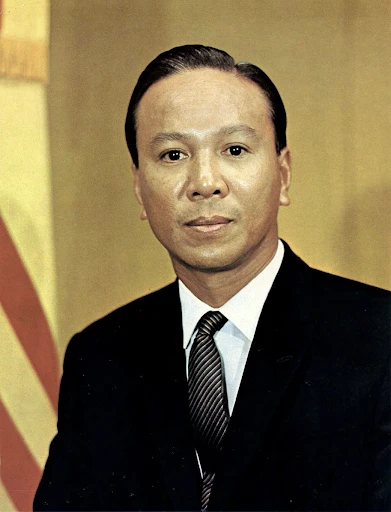
We did that from May until October, and then we finished the negotiations. We finished them actually in October. Of course, at that point we thought we were going to be a big success. Of course, Harriman was very anxious to get this done before the elections to avert, as he put it, the greatest disaster: Richard Nixon. That was the way he felt. So he was doing everything to get Humphrey elected.
Vance was marvelous. They were very political. Of course, we stayed out of the politics. In fact, I think most of those at the meetings wanted to get it done before the election too, because the Vietnamese were being stubborn as hell.
From May, June, July, August, they wouldn’t give a thing. And all of a sudden, one day, we had been pressing them: What would we get if we gave a total bombing halt? For the total bombing halt we wanted, specific things had to happen. And finally, one day, the head of their delegation, a member of the Politburo, said to Harriman and Vance, “If we do so and so and so, will you stop the bombing?” At that point, you knew you had it.
It was just that stubbornness and reading reams of propaganda bullshit, even in the secret talks. They finally agreed to what we needed, and what we wanted, and the deal was cooked. And then something happened.
Q: Before the election.
HABIB: Before the election. First of all somebody got to [South Vietnamese President Ngyuen Van] Thieu on behalf of Nixon and said, “Don’t agree, come to Paris.”
It was done right here in Washington. A Republican went to a famous woman called Anna Chennault. Anna Chennault went to the Vietnamese and told the Vietnamese, “We’ll get a better deal under Nixon.” So Thieu refused to accept the agreement and sent a delegation to Paris. Clark Clifford was fit to be tied, particularly Clark. Harriman was about to climb the wall. Well finally, of course, the election was held and Humphrey lost.
Q: It could have turned out differently.
HABIB: That’s correct. I’m convinced that if Humphrey had won the election the war would have been over much sooner. I know what we were going to negotiate under Harriman and Vance, and that was not what we negotiated under the later generation, basically under Henry Kissinger and Nixon.
Kissinger was somewhat familiar because he had been a consultant. As a matter of fact, the great article that Kissinger had written about the negotiations, he really stole that from us. It was in the form of a briefing which I gave him in Paris before he wrote the article. It was exactly the position that I had in some way espoused. And also I had written a special paper for Harriman on what to do about getting the negotiations on track, which he was going to buy.
Of course, the election was held and a new group came along. First of all, Henry Cabot Lodge was appointed head. You couldn’t get the thing cranked up until after the inauguration, which meant you marked time until January. Meanwhile the Vietnamese agreed to come, so they formed their delegation, and the Viet Cong came with their delegation.
Q: I remember the table problem.
HABIB: A round table, with no sides, our side, your side, was the formula we used. It was a simple thing to arrange. People said it took them three months to decide on the shape of the table, that was a bunch of shit. We knew what the table was going to be from the beginning; it was going to be a round table. It was the only way you were going to solve the problem. We knew that but we had to go through this whole routine of satisfying the South Vietnamese, and beating down the arguments of the North Vietnamese who wanted the VC [Viet Cong] as an equal delegation. They talked about a four-party negotiation, and we talked about an “our side, your side” negotiation.
We finally resolved the problem by a round table. We knew we were going to do that. But you couldn’t solve anything when you didn’t have delegations. And then we had an election and we had to wait until the new administration was in.
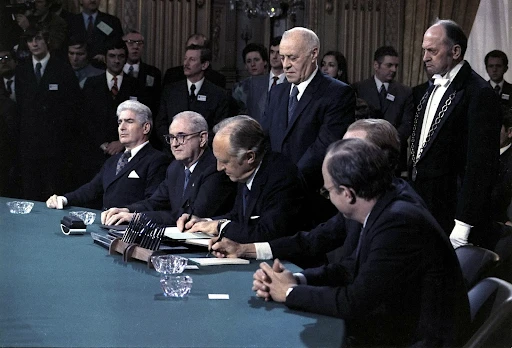
The new administration appointed Cabot Lodge as head of the delegation and, of course, he had a so-called number two called Walsh, a lawyer from New York who didn’t know anything about the problem. He was a Republican lawyer from New York who was in the early Nixon administration. But Cabot insisted that I had to remain. At this point I wanted my just rewards. I could have an embassy anywhere I wanted; I might as well get an embassy….
Cabot came and we began sort of floundering around. At that point Henry Kissinger entered the negotiations by deciding that he’s going to run the secret negotiating…. He had Dick Walters, who was then the military attaché, set up the goddamn negotiation, and said nothing to us. Henry lacked confidence in the secrecy of the Foreign Service. Here I had run the secret negotiations, and he knew me. He knew me for a long time. Hell, I knew him when he was at Harvard.
And yet, instead of getting me to set up the secret negotiations, he gets a military attaché, this secretive fellow called Dick Walters, to set up the negotiations through a Frenchmen, mind you, who was a friend of Kissinger’s. I should say his wife was a friend of Kissinger’s, a guy called Jean Sainteny who was an old Indo-Chinese hand.
He gets the goddamn first secret meeting with them set up through Walters and Sainteny in Sainteny’s apartment. And they go to the meeting and Henry thinks Walters is going to do the interpreting and speak French. He finds out the guys won’t speak French in the negotiations. So he didn’t have them, instead of taking my man, Dave Engel, whom I had offered him. I said to him I knew that they were doing this. He had with him Winston Lord, Tony Lake, and this character, Walters. None of them knew anything about anything at that point compared to us…. I had Dave Engel, I had John Negroponte, I had Dick Holbrooke, Dick Smyser, and he decided to do it this way. Of course, he soon learned that he had to have Dave Engel.
Years later, years later, John Negroponte was head of the delegation, but he was working for Kissinger, not for me. He was on the NSC at that time. He wouldn’t use the mechanism that we had…. They ended up by not being secret. Lodge left because he didn’t want to hang around any longer. I became acting head of the division and lasted about nine months, and then they decided to make it appear as if we were upgrading our interest and had David Bruce come. David lasted several months; I forget how long. He was there for about nine months, and he got fed up and he left. I was acting again, and then I finally broke loose and went as ambassador to Korea….
“Professor Kissinger, you don’t know a goddamn thing about this place”
Q: Had Kissinger come on missions to Vietnam while you were there?
HABIB: Yes. The first time I met him was when he came to Vietnam. You probably never heard him tell that story about the time I threw him out of my office. The first time he ever came in, the first time I ever saw him. He was a professor and Henry Cabot Lodge called me in and said that Johnson was sending this professor out. Did I know this Professor Kissinger? I said, I don’t know him but I know who he is, he’s written that book that everybody knew about, Nuclear weapons and Foreign Policy.
So this guy shows up at my door one morning. I was in one of my particular moods, so I looked at him and said, “Professor, you don’t know a goddamn thing about this place. I’m a very busy fellow. If you want to learn something about it, I’ll give you a couple of my guys who know the language, know the country. You go around the country, spend a couple of weeks looking the situation over, then you come back and I’ll have time to talk to you. In the meantime, get the hell out of my office.”
That’s exactly the way I greeted him. He tells the story all the time. I literally told him to get the hell out of my office, I didn’t have time for him. But he followed my advice. As a matter of fact, I gave him Dave Engel, and I gave him Vlad Lehovich to take him around, take him up country and show him around. I think John Negroponte went with him too to show him a little bit about what the hell the war was all about. Interesting enough, Henry hated to fly, you know, at that time. He was literally pained flying, but he would do it. He would grit his teeth and he’d go up in these goddamn little airplanes and flit around the countryside. Then he came back and we became very good friends.
Having a Heart Attack before a White House Meeting
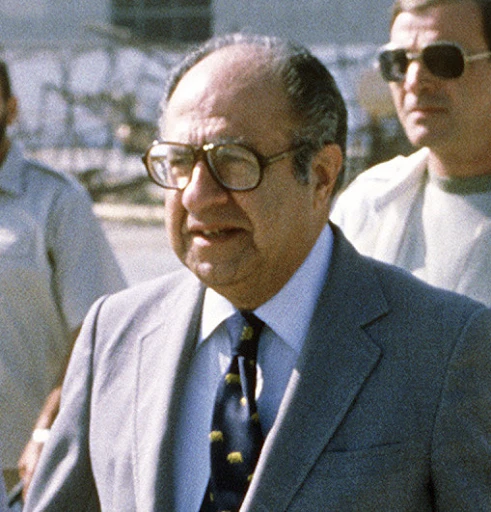
I was due at the White House for breakfast, [Israeli Prime Minister] Menachem Begin, [Secretary of State] Cy Vance and the president. And I had told Cy the night before when we got in to Andrews, “I’ll meet you at the office at 7:00 and we’ll go over together.” But I got to the office at 7:00 and barely made it to the room, collapsed, and they called an ambulance and I got hauled out to Walter Reed. So I didn’t make the breakfast with Begin and the president. They put me in intensive care in Walter Reed….
Q: They had your file.
HABIB: Yes, and I had a [cardiac] arrest that day. They had sedated me so they shocked me back with the paddles. They kept me there for a few days, and by golly I had another arrest. I got over it, and they put me on a lot of pills, I was taking at one time something like 36 pills, each a different kind, in one day. I’d have to get up in the middle of the night and take a pill.
They were trying to adjust the rhythm of my heart by pills. What had happened, of course, the first heart attack left a scar and a bulge in my heart and that would always stay with me, and the pain. So the next thing I know, they said I’m in the hospital recuperating and when I recuperated I came back to the Department. Oh well, now you can go back to work, other people do.
And I said, no, I don’t think so. I’ll take some time off to see if I can get my health back. So I went out to Stanford as Diplomat in Residence.
The Lebanese Civil War – “That’s when I resigned for the last time”
There was practically no evidence of any hostile action from Lebanese territory directly into Israel. The Israelis won’t admit that, but it’s true. We kept track of those damn things. Now, they had this plan, [Israeli Prime Minister Ariel] Sharon had this plan that had been made in Lebanon to crush the Palestinian movement. That’s what he told me when he told me about this plan, and showed me what it was.
I told him it was no goddamn good, and I was right, but he didn’t pay any attention. The next day you know the war is on and everything that goes with it. At that point we began to question, how do you stop the war? I had eleven ceasefires, then the twelfth one. Sometimes a ceasefire would last for a day, sometimes an hour, sometimes three days, it never would last.
And it was not always the Arabs’ fault. The Israelis had this strange notion that if you declared a ceasefire you could move your troops around. So they would accept the ceasefire and then they would move their troops, and the other guys would shoot at them and they’d say, “They broke the ceasefire.” I once said to the prime minister, a friend of the defense minister and the foreign minister, that I was going to have to get this new definition of a ceasefire written up in the annals of the War College.
But that’s what happened. I was terribly busy running from country to country. Trying to get the Saudis and the Syrians to do things, talking to the Syrians directly to get them clued in, keeping the Israelis on board, flying in and around and up and down. It wasn’t too bad.
Well, I then got to talk ceasefire and it held [for a while] but I got to a point where I was really fed up with the senselessness that was going on. I had practically got an agreement with the PLO and the Syrians to get their troops out of Beirut. I was negotiating the details and what follows and all that, and still the Israelis were hitting the cities.
So I used to call Washington up on a secure line and said I wanted to talk to the Secretary. When they got the Secretary on the phone, I said, “Now this has got to stop. Its just can’t go on this way.” He said, “What do you recommend?”
I said, “I recommend the President pick up the telephone and talk to Menachem Begin.”
That’s what happened. That led to a disengagement of forces, and bringing in the multinational force and a ceasefire that held long enough to get an election in Lebanon. Things seemed to be going in the right direction, and the war started all over again.
At that point, we were in negotiation involving Israel, the Lebanese, a negotiation which I opposed. The Israelis insisted they wanted a negotiation. So I’m not getting anywhere. I went to the president and secretary and said, “My idea is that I should go over there now with a solution and say, ‘Look, fellows, tell me what you want and we’ll put it together’.”
I talked to the Lebanese; they were all right, I had a pretty good understanding with agreement to them. I go to Israel and I had the whole cabinet, the senior members of the cabinet. I started talking about my ideas…and Sharif pulled out a piece of paper and he said, in effect we’re way ahead of you, we’ve got this working paper with the Lebanese, this is the start of the settlement [talks] in Washington.
I couldn’t believe it, I didn’t know anything about it. I had not been in that part of the world in several months. I was out in California….
At any rate, it was a bad turn of events. So we began plodding back to the negotiations, and finally got them through. By the time they were finished, they weren’t worth the paper they were written on, because they obviously couldn’t be implemented. I remember I used to sometimes say to the Lebanese, you can’t demand this. You can’t demand [that] because if you do the Syrians won’t accept it. They wanted to get the maximum benefits to justify the war. But by now the war had turned sour. Those attitudes were very sour towards the war.
Q: And the Syrians were very proud of their negative reality.
HABIB: All of this took so much time. The Syrians get reinforced…. The Israelis supported the Christians; they supported that other group. The fighting began to stir up again. After the agreement was signed I was going over to Syria to talk with Assad.
I got the word back that I wasn’t welcome because I had misled him in the early days on the ceasefire. I didn’t mislead him. The Israelis would agree to the terms and then they would break them. But he held that against me.
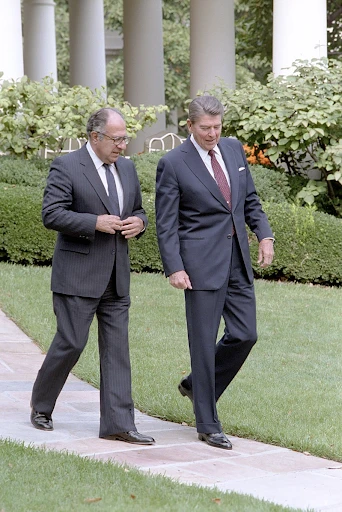
Q: That you had deceived him on the ceasefire.
HABIB: So I said to the President, well, if he doesn’t want to see me — that’s when I resigned for the last time.

Comments are closed.